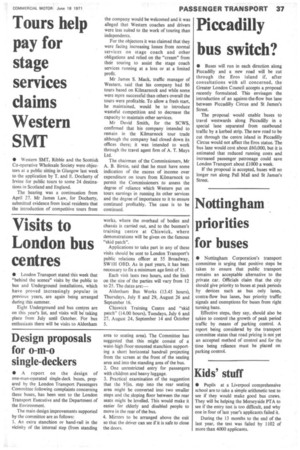Tours help pay for stage services claims Western SMT
Page 39

If you've noticed an error in this article please click here to report it so we can fix it.
• Western SMT, Ribble and the Scottish Co-operative Wholesale Society were objectors at a public sitting in Glasgow last week to the application by T. and E. Docherty of Irvine for public tours to some 24 destinations in Scotland and England.
The hearing was a continuation from April 27. Mr James Law, for Docherty, submitted evidence from local residents that the introduction of competitive tours from the company would be welcomed and it was alleged that Western coaches and drivers were less suited to the work of touring than independents.
For the objectors it was claimed that they were facing increasing losses from normal services on stage coach and other obligations and relied on the "cream" from their touring to assist the stage coach services running at a loss or at a limited profit.
Mr James S. Mack, traffic manager of Western, said that his company had 86 tours based on Kilmarnock and while some were more successful than others overall the tours were profitable. To allow a fresh start, he maintained, would be to introduce wasteful competition and to decrease the capacity to maintain other services.
Mr David Smith, for the SCWS, confirmed that his company intended to remain in the Kilmarnock tour trade although the company had closed down its offices there; it was intended to work through the travel agent firm of A. T. Mays Ltd.
The chairman of the Commissioners, Mr A. B. Birnie, said that he must have some indication of the excess of income over expenditure on tours from Kilmarnock to permit the Commissioners to assess the degree of reliance which Western put on tours earnings in running its other services and the degree of importance to it to ensure continued profitably. The case is to be continued.
































































































































